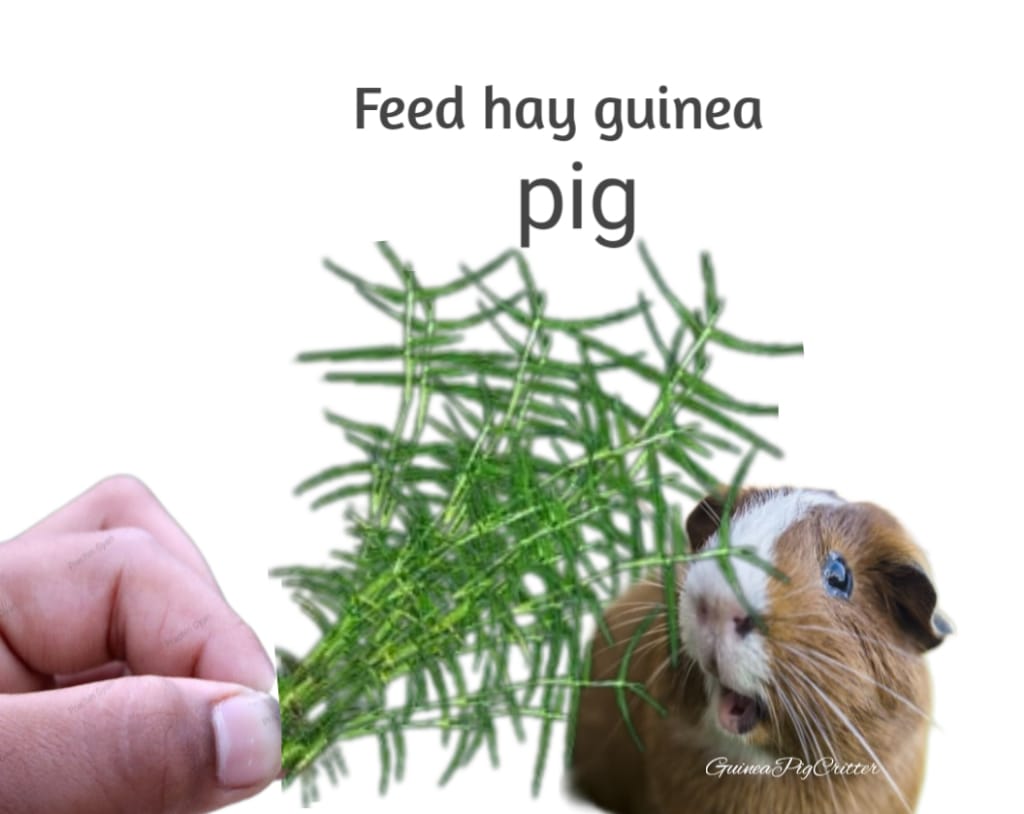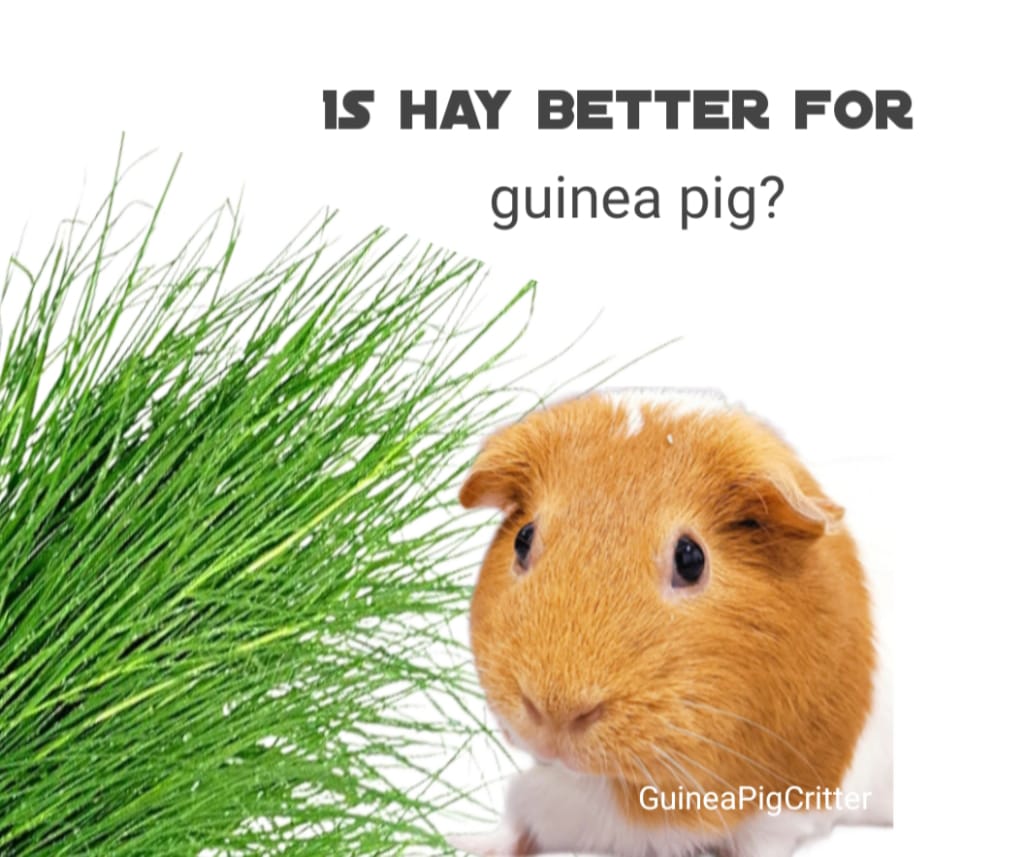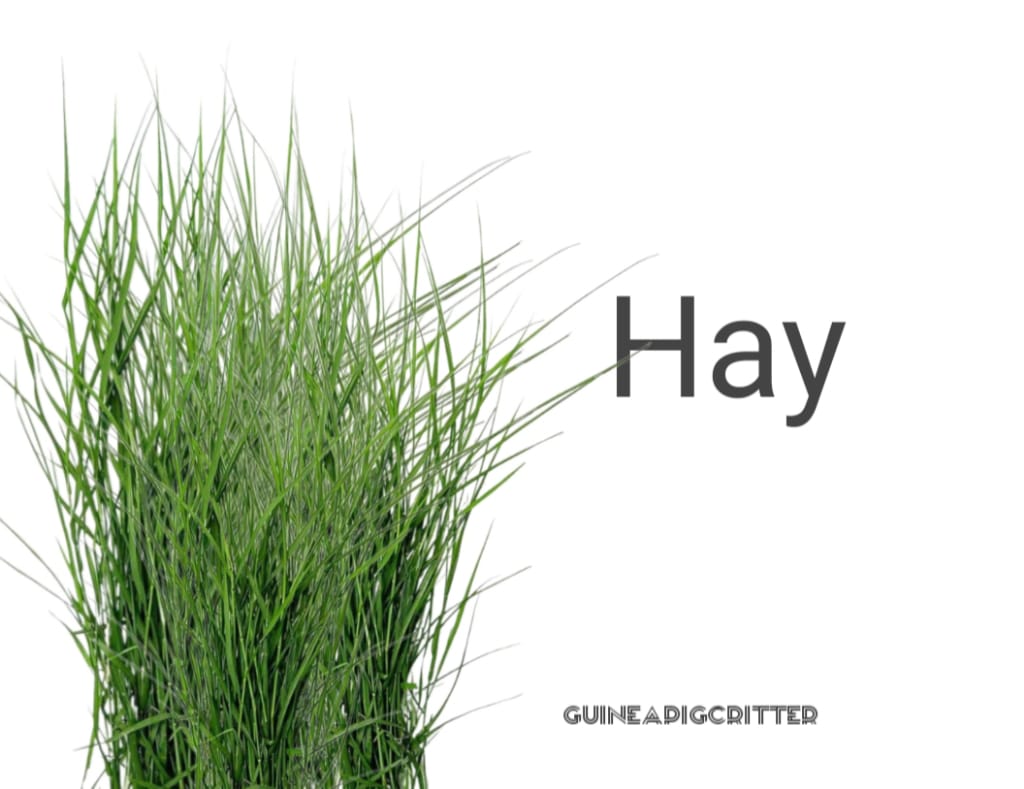Guinea pigs, also called cavies, are small and adorable animals that famous for being friendly and having unique sounds.
Being herbivores, their diet is vital to their growth and sustenance, and hay is often viewed as a cornerstone of this dietary plan. But is it really true?
So, Today’s Question is: Is hay better for guinea pigs?
This comprehensive blog will look at why guinea pigs need hay in their diets, explore the different types of hay available for them and offer practical tips to ensure your guinea pig gets the best nutrition possible.
Why Hay is Essential for Guinea Pigs
Nutritional Benefits:
High levels of Fiber: In guinea pigs, hay has high fiber content that helps in maintaining a healthy digestion system. It facilitates food movement through the gastrointestinal tract hence preventing issues related to impaction or diarrhea.
Low Calorie Content: As part of its nutritional properties, hay has low calories which make it perfect for maintaining normal weight. Some health problems associated with obesity such as diabetes mellitus or heart disease can affect these domestic rodents.
Rich in Vitamin and mineral contents: High-quality hay contains important vitamins and minerals including vitamin C which is essential for guinea pigs because they cannot synthesize it themselves.
Dental Health:
Hay as a Natural Chewing Action: Guinea pigs chew a lot of hay, and this helps to wear down their teeth that continuously grow. When not enough chewing is done, their teeth may overgrow resulting in dental problems like malocclusion.
Chew More Regularly for Preventing Dental Disease: The constant chewing of hay helps prevent the occurrence of dental diseases that can lead to pain and difficulties while eating.
Mental Stimulation:
Foraging Behavior: Provision of hay encourages natural foraging behavior to prevent boredom and offer mental stimulation for the animals.
Environmental Enrichment: For instance, hay can be used for nesting and burrowing to enrich their habitat.
Read this post :-Guinea Pigs Can Be Fed Celery?
Types of Hay Suitable for Guinea Pigs
A number of different types of hay are suitable for guinea pigs each with its own advantages. Here’s a closer look at the most common varieties:
Timothy Hay:
Nutritional Profile: It is high in fiber, contains moderate protein levels, and is low in calcium hence recommended as an everyday feed for guinea pigs.
Digestive Health: High fiber contents facilitates healthy digestion hence preventing stomach upsets among other gastrointestinal issues.
Availability: Timothy hay is available widely; it comes in various cuts such as first cut, second cut, and third cut which vary in texture and nutritional value.
Orchard Grass Hay:
Softer Textured: It is soft and sweeter than Timothy hay, which makes it an ideal choice for guinea pigs that may be selective eaters.
Great Fiber Source: It contains lots of fiber which promotes better digestion.
Diverse: Offering orchard grass hay together with other hays can add diversity in texture and taste.
Meadow Hay:
Different Nutritious Elements: Meadow hay is a combination of diverse wild plants and grasses hence providing different nutrients to guinea pigs.
Foraging Experience: There are various meadow plants that provide natural foraging experience to guinea pigs.
Alfalfa Hay:
High Calcium and Protein Content: Alfalfa hay is rich in calcium and protein compared to other hays; hence it is suitable for young growing guinea pigs as well as pregnant or nursing females.
Restricted Use by Adults Only: Due to its high calcium level, adult guinea pigs are advised against taking alfalfa so as to prevent urinary tract problems.
Oat Hay:
High Fiber Amounts: Another option, oat hay has more fiber that can aid in supporting a healthy digestive system
Texture Variety: The rough feel of the oat hay gives an alternate chewing feel which can contribute positively to dental hygiene.

Following factors should be considered when choosing hay for your guinea pig;
Freshness:
- Green Color: Fresh hay is green and fragrant, not brown or musty.
- Mold: Check that there is no mold, dust, or foreign objects in the hay.
Types of Cut:
- First Cut: It has coarser strands which are higher on fiber suitable for maintaining dental healthiness.
- Second Cut: This cut is leafier and softer then the previous one hence more likely to be preferred by those who are selective eaters.
- Third Cut: This cut has the softest leaves with highest calorie content and lowest level of fiber usually used as a treat or supplement.
Packaging:
- Bulk vs. Small Bags: Although it might be cheaper to buy in bulk ensure you have storage solutions that will keep it fresh.
Compressed Hay:
- These bales take up less space and can also be a convenient option.
How much Hay Should Guinea Pigs Eat?
Guinea pigs should have unlimited access to hay. Which means they should always have any amount of hay available for them. The most part of their meal around 70-80% needs to be good quality hay. This ensures they receive enough fiber while helping to wear down their teeth naturally.
Feeding Guidelines on a Daily Basis:
- Loads of Hay: Always have a brand new stack of hay in their living space.
- Renew Frequently: The hay should be changed every day to make sure that it remains clean and free from droppings.
- Observe Intake: Keep monitoring the amount of hay that your pet guinea pig is eating, and adjust accordingly to ensure adequate feeding.
Hay-Related Potential Problems and Possible Solutions
While hay is an essential part of a guinea pig’s diet, there are some potential issues to consider:
Allergic Reactions:
- Sensitivity to Dust: Dust in hay may cause allergic reactions to certain guinea pigs. Instead, shake off such dust or choose dust-free hays for your pet.
- Skin Allergies: In case you notice any skin irritations or breathing problems, try a different type of hay.
Aversion To Selective Feeding:
- Choosy Eaters: Some guinea pigs may refuse to eat some kinds of hays. Try various types as well as cuts to know what they like most.
- Blending Hays: Combining different hays fosters increased consumption by choosy eaters leading to greater dietary fiber intake.
Storage:
- Appropriate Storage: Ensure that the hay is kept fresh and mold does not grow by keeping it in cool dry place.
- Avoid Plastic Bags: Breathing storage containers or bags should be used rather than plastic bags because they tend to hold moisture.
Other Guinea Pig Dietary Needs
Although hay is the mainstay of a guinea pig’s diet, it should be supplemented with other foods to create balance.
Fresh Vegetables:
- Daily Greens: Every day, give your guinea pig a variety of fresh vegetables like bell peppers, kale and cilantro.
- Vitamin C Sources: Guinea pigs require this essential vitamin for survival so include bell peppers and parsley in their diet.
Pellets:
- Fortified Pellets: Provide small amounts of high-quality guinea pig pellets fortified with vitamin C.
- Moderation: Limit pellet intake to about 1/8 cup per day to prevent weight gain.
Fresh Water:
- Unlimited Access: Always ensure that your guinea pig has fresh, clean water available to drink.
- Change Daily: Change the water daily so that it remains fresh free from contaminants.
Read also :-Can Guinea Pigs Eat Pumpkin?
The Role Hay Plays in Preventing Health Problems
Regular hay intake plays a critical role in preventing multiple health problems among guinea pigs:
Dental Problems:
- Overgrown Teeth-Guinea pigs’ teeth can become overgrown without enough hay for chewing. That can result in pain, difficulty eating or possible infection.
- Malocclusion– Chewing on hay will help prevent malocclusion which is the misalignment of teeth.
Digestive Ailments
- GI Stasis: Hay helps to keep the digestive tract moving by providing fiber, which effectively prevents gastrointestinal stasis – a potentially fatal condition.
- Diarrhea: Diets rich in fiber help support healthy gut flora and deter occurrences of diarrhea.
Overweight:
- Weight Management: Low in calories, hay can help manage your guinea pig’s weight and avoid obesity related health issues.
Urinary Health:
- Calcium Balance: Offering multiple types of hays will assist with calcium control and prevent urinary tract diseases like bladder stones.
FAQs: Frequently Asked Questions
Can guinea pigs eat all types of hay?
Guinea pigs can consume several different types of hay, but it is important to select fresh, high-quality hays. Timothy hay, orchard grass, meadow hay and oat hays are all good choices. Alfalfa should be given only to younger guinea pigs that are still growing or pregnant/nursing females because they require more calcium.
How much hay should I give my guinea pig?
Hay should never be limited for a cavy as it is their staple diet; they should always have access to fresh hay in their living quarters.
Is it possible to replace fresh vegetables in a guinea pig’s diet with hay?
No, hay cannot be replaced by fresh vegetables. Although hay is an imperative source of fiber, vegetables help in getting essential vitamins and minerals into the organism including vitamin C among others. A healthy diet should include both hay as well as vegetables.
What can I do if my pet guinea pig is not eating enough hay?
If your guinea pig is refusing to eat enough, try offering different types or cuts of hay to see what they prefer. Mixing hays can also encourage them to eat more. Make sure they always have unlimited access to fresh hay and reduce the amount of pellets and treats given out so that they would prefer eating more of the hay instead.
Might guinea pigs have an allergy to hay?
Others might have health issues related to having the dust from the hay in their lungs due to which they experience respirational problems or get other conditions related with the skin. If this problem continues, ask a specialist if there is any other kind of hay.
Conclusion
Hay is undeniably one of the best foods for guinea pigs as it provides necessary fiber for digestive health, supports dental well-being and offers mental stimulation. Therefore, by selecting good quality hay and making sure your guinea pig has constant access to it, you will be helping them maintain good health and happiness.
Lastly, ensure that the diet includes fresh vegetables along with fortified pellets and plenty of drinking water so that your companion animal can have a balanced nutritious meal. Given proper attention towards its dietary needs including all nutritional requirements stated above can help increase its lifespan and thus provide a long lasting life.



